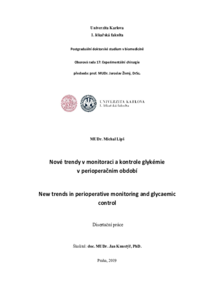Nové trendy v monitoraci a kontrole glykémie v perioperačním období.
New trends in perioperative monitoring and glycaemic control.
dizertační práce (OBHÁJENO)

Zobrazit/
Trvalý odkaz
http://hdl.handle.net/20.500.11956/106165Identifikátory
SIS: 172332
Katalog UK: 990022801620106986
Kolekce
- Kvalifikační práce [4894]
Autor
Vedoucí práce
Oponent práce
Bešík, Josef
Beneš, Jan
Fakulta / součást
1. lékařská fakulta
Obor
-
Katedra / ústav / klinika
Klinika anesteziologie a resuscitace a intenzivní medicíny 1. LF UK a VFN
Datum obhajoby
27. 5. 2019
Nakladatel
Univerzita Karlova, 1. lékařská fakultaJazyk
Čeština
Známka
Prospěl/a
Klíčová slova (česky)
intenzivní inzulínová léčba, kontrola glykémie, hyperglykémie, hypoglykémie, intenzivní péče, kriticky nemocný, kardiochirurgický výkonKlíčová slova (anglicky)
intensive insulin therapy, glycemic control, hyperglycemia, hypoglycemia, intensive care, critically ill, cardiac surgical procedureSouhrn Postoj specialistů intenzivní medicíny ke kontrole glykémie u kriticky nemocných prošel za poslední dvě desítky let zásadním vývojem. Jak v literatuře, tak na diskuzních panelech během setkání odborníků doma i ve světě bylo a je možné zaznamenat extrémně invazivní přístup se snahou o těsnou kontrolu glykémie v rozmezí 4-6 mmol/l u všech kriticky nemocných, stejně jako naprosto liberální toleranci glykémií nad 12 mmol/l. Tato práce si v úvodu klade za cíl objasnit příčiny těchto extrémních postojů analýzou klíčových prací posledních let a najít důvody jejich tolik rozdílných výsledků. Dle výsledků studií za poslední dobu je zřejmé, že nejvíce z těsné kontroly glykémií profitují pacienti po kardiochirurgických výkonech. Právě na této skupině pacientů jsme se s naším týmem snažili získat odpovědi na tři klíčové otázky. Za předpokladu, že koncept těsné kontroly glykémie je smysluplný, zajímá nás: 1) Je pro úspěšné a bezpečné provádění konceptu těsné kontroly glykémie důležitý nejen vzdělaný a zkušený zdravotnický personál, ale i použití specifického algoritmu-protokolu kontroly glykémie? 2) Jaké je ideální načasování zahájení těsné kontroly glykémie u kardiochirurgického pacienta a má to vliv na morbiditu či mortalitu těchto nemocných? 3) Existuje bezpečnější alternativa k intenzivní inzulinové terapii,...
Glycaemic control in critically ill patients has been a topic of considerable attention for the past 20 years. In literature and at scientific meetings, there have been ongoing debates regarding the efficacy of glycaemic control in these patients with frequently entirely opposite opinions. These range from a strict invasive approach with target glycaemia 4-6 mmol/l to a liberal approach tolerating even values higher than 12 mmol/l. In the preview of this PhD thesis we have analysed so far published literature and describe the reasons for this inconsistency. According to the results of recent studies, the most significant efficacy of tight glycaemic control has been observed in cardiac surgical patients. If we consider the concept of tight glycaemic control as efficient strategy, there are three important questions remaining unanswered as follow. Does the specific algorithm-protocol play a key part in the concept of tight glycaemic control alongside the knowledge and skills of nursing staff in safe and efficient blood glucose control? What is the ideal timing of starting the strategy of tight glycaemic control (TGC) in cardiac surgical patient? And is there any benefit in outcome respect to mortality or morbidity? Do we have any more safe and efficient option or add-on to standard perioperative...
